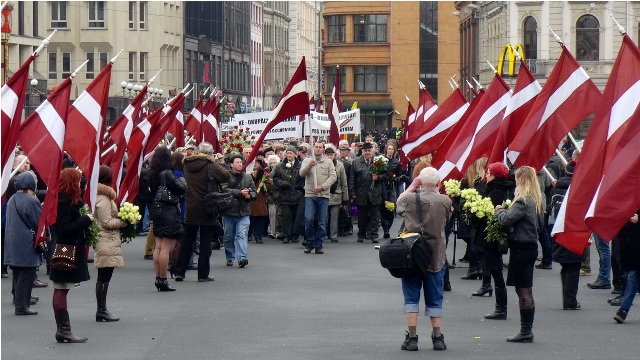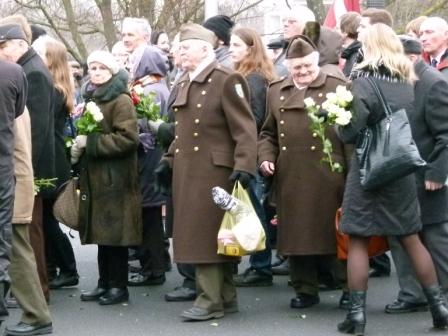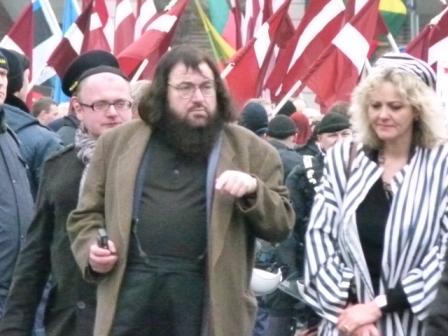E Y E W I T N E S S R E P O R T / O P I N I O N
by Roland Binet (Braine-l’Alleud, Belgium)
RIGA—The day is a festive one despite the gray and low sky. Young pretty girls have bunches of roses which they soon distribute to elderly and solemn gentlemen arriving, row upon row in an interminable procession. Numerous national flags are held in a heraldic and staid way by young men forming a kind of double guard of honor.


Photo: Francine Casteels
The elderly men ― some in brown uniforms of unknown nature ― accompanied by adults, young girls and men, defile. They are singing a haunting song. There is a sense of joy, of accomplishment, of fond memories. There is, also, a general feeling of togetherness and purpose.
These men know why they are here for. They relish the memory of what they did, of what they were able to accomplish.
They are old combatants united in the belief that they fought to preserve the independence and honor of their Latvian country of birth.
This is March 16, 2012 in Riga. A time of celebration.
Some of these men fought in Russia prior to the official formation of two SS Divisions in 1943. Five battalions of volunteers were formed early in 1942 and were sent to the Leningrad Front (21st Liepajas, 19th Latgales, 24th Talsu, 16th Zemgales, 26th Tukuma Battalions). Undoubtedly, these were tough highly motivated troops.
What did they do in Leningrad? Preserving the independence and honor of Latvia. And, by the way, helping to maintain the terrible blockade of that cultural city of Leningrad by the Nazis. Helping the formidable Nazi death-machine to starve to death and bomb a population that had to survive with less than 800 calories per day, a population which had had no warming systems since the beginning of the blockade in the fall of 1941. These men, in a small but significant way, thus contributed in killing one and a half million civilians during the siege of Leningrad.
And, before the “official” creation of two Waffen SS divisions in Latviain early 1943, other equally tough and motivated military or semi-military units (Schutzmannschaften Battalions, Police Auxiliary Units ― the Hiwis ―, the Arājs Kommando, self-proclaimed “partisan” groups and others) had acquired a large amount of military experience in Latvia in combating unarmed civilian Jews, in helping to deport them to killing zones, robbing them of their clothes and dignity, assembling them along mass graves and in many cases actually shooting them (sometimes pausing in order that someone – as for example Oberscharführer Carl Emil Strott ― might take a picture of the mass massacres in Skēde in the Liepaja region).
And after the formation of the famed and much decorated Latvian Legion as part of the 15th and 19th Waffen SS Divisions, in 1943, many of these men with previous military experience dealing with Jews and partisans, joined Hitler’s elite troops. Others, as for example the 22nd and 227th Police Battalions were otherwise busy in the summer of 1942 rounding up Jews in Warsaw for deportation to Treblinka, or later in April/May1943 in repressing the uprising in the Warsaw Ghetto.
March 16th is the day of the Legionnaires in Latvia. And, these “wonderful” fighters are well thought of and respected throughout that nation, now a full member state of the European Union.
Was it not Latvia’s president, Mr. Andris Berzins, who, on February 28th, said on the LNT TV channel that “the nation should bow to its Waffen-SS veterans, many of whom died for their Fatherland.”
The Waffen SS soldiers swore an oath of allegiance to Adolf Hitler.
These men were the ideological arm of the Nazi regime, the personal military guardians of Hitlerism, the defenders and propagators of the ideas he so precisely crafted in Mein Kampf. Two of which dealt with sub-races, the Jews and the Slavs: Untermenschen. To be eradicated at all costs. By his armed elite. The SS.
Some would say, a bit naively, that the Latvian Legionnaires did not participate in killing Jews, Soviet citizens and everybody smacking or suspected of Communism.
Well, let me say this: first of all, the SS in its totality was declared a criminal organization by the Nurnberg Trials of 1945/1946. And apart from Stalin’s representatives (who would have been biased), there were judges from democratic nations such as the United States, the United Kingdom and France, as well as observers from other allied nations. The pronounced sentence of criminal activity included the Waffen SS soldiers.
Moreover, even if the Latvian Waffen SS did not participate at all in the extermination of Jews in Latvia and civilian Soviet populations ― an affirmation far from proved ― the fact that they fought so well (the highest number of decorations was attributed to the men of the 15th and 19th Waffen SS divisions among all SS volunteers of Europe), so toughly “for” their Latvian Fatherland, even outside its frontiers, created the conditions to delay unnecessarily the end of the war, created the ideal conditions so that Himmler’s well-oiled destruction machine could send more Belgian, Dutch, Hungarian, Italian, Slovakian Jews, among many others to the gas chambers in Birkenau and elsewhere. With millions of lives lost.
And, I may be naive but now that the European Commission has, on February 21, 2012, put its Report on Latvia online, strongly condemning the annual march in honor of the SS Legionnaires in Riga, why do the European Parliament members remain silent about an EU country honoring soldiers who, directly or indirectly, participated in a mechanism conducive to crimes against humanity and genocide?

Three of the anti-Nazi protesters, from left to right: Kazimier Andrushkevich (Vilnius), Dovid Katz (Vilnius), and Monica Lowenberg (London). Photo: Francine Casteels.
And why, also, apart from Jewish and Russian individuals and organizations, are there so few reactions from intellectuals in Western European countries?
Aren’t there intellectuals with a modicum of courage in Western Europe anymore?
Or maybe the fact that a member of the EU honoring Hitler’s dear children of war is not important or exciting enough to warrant comments?